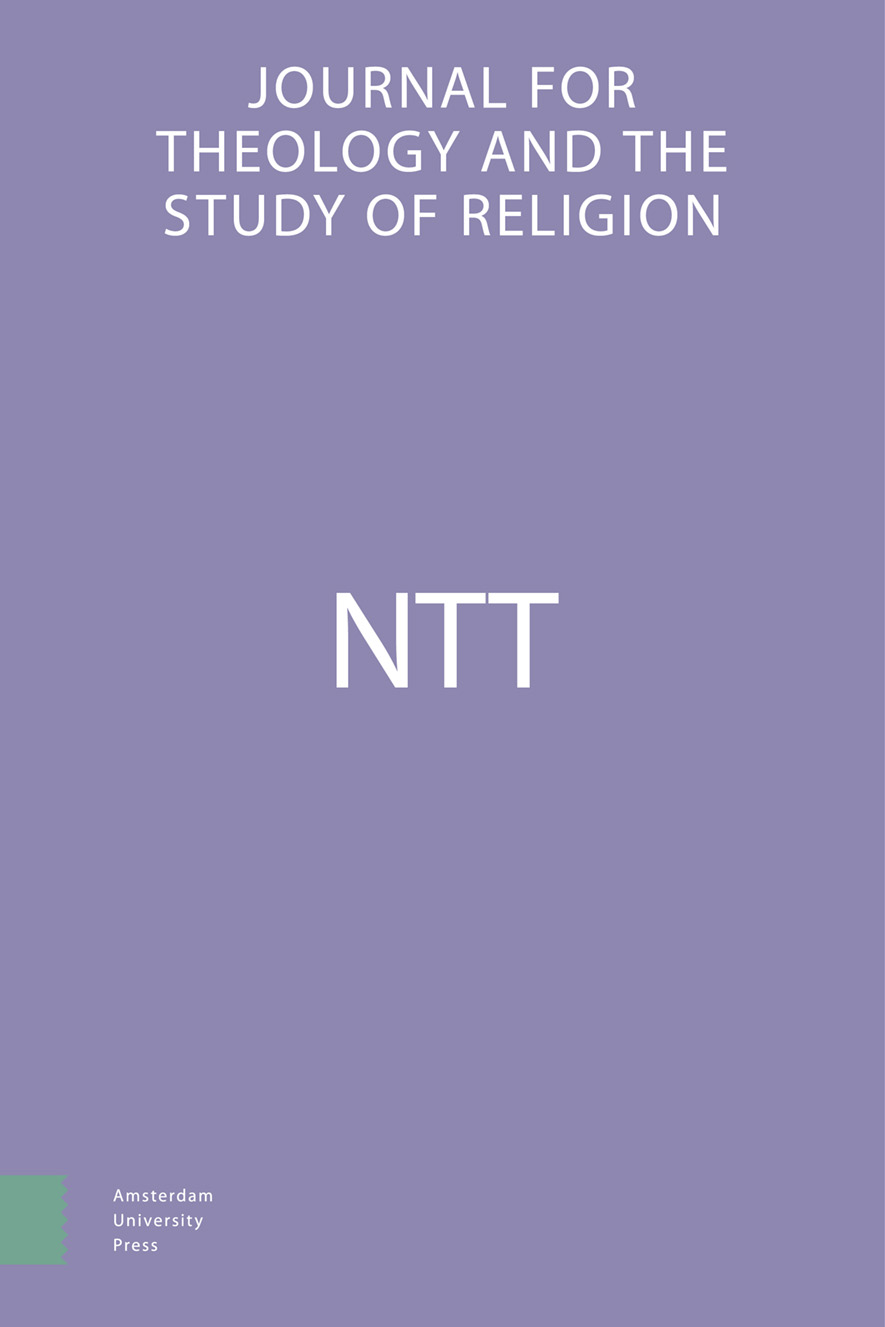- Home
- A-Z Publications
- NTT Journal for Theology and the Study of Religion
- Previous Issues
- Volume 55, Issue 4, 2001
NTT Journal for Theology and the Study of Religion - Volume 55, Issue 4, 2001
Volume 55, Issue 4, 2001
-
-
Paulus vermag alles door de kracht van God Zwakheid en sterkte
More LessAuthor: J. LambrechtAbstractThe paradoxical statement of 2 Cor. 12:10b ( ‘For whenever I am weak, then I am strong’) is investigated. A so-called ‘dialectic’ or ‘polar’ understanding of Paul’s strength in weakness – Paul is weak, Christ is strong – has recently been defended by H.J. Nielsen and U. Heckel. Is this interpretation correct? G.G. O’Collins has proposed an ‘ontological’ exegesis which seems to be a better interpretation. The analysis of the ‘Fool’s Speech’ (2 Cor. 11:22-12:10) shows how Paul himself, through Christ’s strength, is strong, notwithstanding human weakness. Moreover, texts such as 1 Cor. 15:10 and 2 Cor. 13:4 indicate that Paul, through divine power, can also be humanly and apostolically strong, without weakness.
-
-
-
Toen zei David: God verdoeme mij ...
More LessAuthor: Paul SandersAbstractAs English ‘goddam(n)’ or ‘goddamned’, the repelling Dutch curse ‘godverdomme’ has to be derived from a conditional self-imprecation: ‘God verdoeme mij, als ‘ (‘God damn me, if ... ’). Dutch Christians often regard the curse as a violation of the Third Commandment. However, in Old Testament Hebrew a similar formula is found: (‘God may do this to me and more than that, if ... ’). The biblical passages where the expression occurs do not display any resistance to the use of the formula, even though it was often pronounced inconsiderately.
-
-
-
Bavinck en het ‘Concessionisme’
More LessAuthor: Dirk van KeulenAbstractIn an article on the development of the doctrine of Scripture in the Reformed Churches in the Netherlands (Gereformeerde Kerken in Nederland) during the 20th Century, H.M. Vroom suggests that the reformed theologian Herman Bavinck’s doctrine of Scripture resembles that of ‘Concessionism’ (a movement among catholic exegetes in France around 1900). If Vroom is right, this would have far-reaching consequences for Bavinck-interpretation. Comparing Bavinck’s description of ‘Concessionism’ to his own views, one sees some points of agreement: with regard to the purpose of exegesis; the view that Scripture cannot be used as a handbook for several sciences (e.g. geology, biology, history); and the view that one should consider the genre of the text in interpreting Scripture. On important points however, Bavinck disagrees with the ‘Concessionists’.
-
-
-
Is ons universum deterministisch? Filosofische en theologische bijdragen aan een theologie van Gods handelen
More LessAuthor: Taede SmedesAbstractIn this article two problems are discussed: first, whether it is possible to speak about God’s action in a scientific context, and second, whether such a scientific concept of God would resemble the Christian concept of God. If our universe is deterministic, God’s action is excluded, for then our universe is ‘closed’ in that it contains all the conditions necessary for scientific explanation. The main line of this article thus revolves around the question whether we have conclusive reasons to believe our universe is deterministic. The conclusion, based on physical, epistemological, and logical arguments, is that we do not.
-
-
-
Judaica en Samaritana: een besprekingsartikel
More LessAuthor: Pieter W. van der HorstAbstractReview of two recent publications in the field of jewish and Samaritan studies, namely J. Neusner, A.J. Avery-Peck, W.S. Green (eds.), The Encyclopaedia of Judaism, 3 vols., Leiden 2000, and A. Tal, A Dictionary of Samaritan Aramaic, 2 vols., Leiden 2000.
-
Volumes & issues
-
Volume 79 (2025)
-
Volume 78 (2024)
-
Volume 77 (2023)
-
Volume 76 (2022)
-
Volume 75 (2021)
-
Volume 74 (2020)
-
Volume 73 (2019)
-
Volume 72 (2018)
-
Volume 71 (2017)
-
Volume 70 (2016)
-
Volume 69 (2015)
-
Volume 68 (2014)
-
Volume 67 (2013)
-
Volume 66 (2012)
-
Volume 65 (2011)
-
Volume 64 (2010)
-
Volume 63 (2009)
-
Volume 62 (2008)
-
Volume 61 (2007)
-
Volume 60 (2006)
-
Volume 59 (2005)
-
Volume 58 (2004)
-
Volume 57 (2003)
-
Volume 56 (2002)
-
Volume 55 (2001)
-
Volume 54 (2000)
-
Volume 53 (1999)
-
Volume 52 (1998)
-
Volume 51 (1997)
-
Volume 50 (1996)
-
Volume 49 (1995)
-
Volume 48 (1994)
-
Volume 47 (1993)
-
Volume 46 (1992)
-
Volume 45 (1991)
-
Volume 44 (1990)
-
Volume 43 (1989)
-
Volume 42 (1988)
-
Volume 41 (1987)
-
Volume 40 (1986)
-
Volume 39 (1985)
-
Volume 38 (1984)
-
Volume 37 (1983)
-
Volume 36 (1982)
-
Volume 35 (1981)
-
Volume 34 (1980)
Most Read This Month

Most Cited Most Cited RSS feed
-
-
How to read Philo
Author: D. T. Runia
-
- More Less

